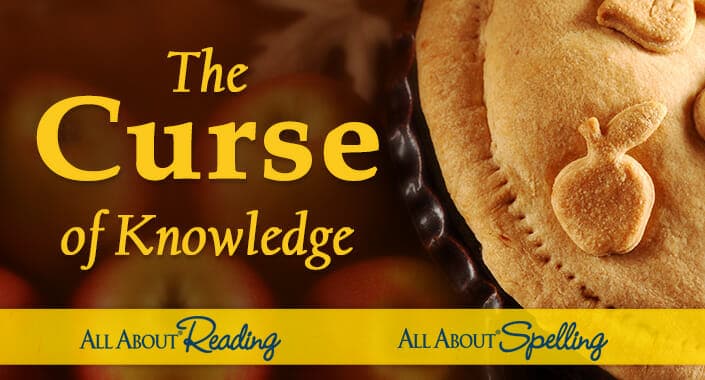
As your child’s teacher, you possess something of value that your student needs — knowledge. One of the great challenges of teaching is discovering the most effective ways to transfer your knowledge to your child.
But believe it or not, sometimes your knowledge can be more of a hindrance than a help as you attempt to pass knowledge on to your child.
I know it seems illogical, but it’s true.
Knowledge can be a curse to the teaching process.
Authors Chip Heath and Dan Heath describe this “curse” in their book Made to Stick: Why Some Ideas Survive and Others Die. Their idea is that the more you know about a subject, the harder it can be to transfer that knowledge to a person who has little knowledge of the subject.
Think about baking a pie…
Your Aunt Sally knows how to bake the perfect pie crust. In fact, she’s done it so often that she doesn’t need a recipe. She just does it by feel. And if you ask her to teach you, she’ll probably say something like, “Just keep adding water until it feels right” or “Knead the dough until it’s the perfect consistency.”
Not very helpful, is it? A novice pie-baker can’t possibly know what “feels right” actually means. He lacks the experience that helps him recognize what the “perfect consistency” feels like. As delicious as Aunt Sally’s pies may be, sadly she’s suffering from the “curse of knowledge.” Her knowledge may help her make a great pie, but it has become a curse to the process of teaching you to make a great pie. Being good at baking a pie doesn’t necessarily make you good at teaching someone to bake a pie.
So what does pie baking have to do with teaching reading and spelling?
What is true in baking pies, is also true in learning to read. You may be an excellent reader, but most of us can’t remember what it was like not to be able to read — and that curse of knowledge can make it difficult to begin the process of teaching a child who has no reading experience.
The curse of knowledge can affect your effectiveness as a teacher by causing you to forget that your child doesn’t have the benefit of the knowledge that you possess. You have the big picture in your brain and you understand how the information you have fits together, but your child does not.
Imagine trying to fit the pieces of a puzzle together without the benefit of the picture on the front of the puzzle box. We need to remind ourselves that our children are working with small pieces of information without the benefit of the big picture.
How do you move beyond the curse of knowledge?
Here are some tips for helping you avoid the pitfalls created by the curse of knowledge.
Empathize with your child. Remember that learning can be hard work! Be encouraging during the learning process.
Don’t assume. Always try to keep in mind the many things your child doesn’t know, being careful not to assume your child knows something automatically.
Take things slowly. Don’t try to explore too much information in a short period of time. Respect your child’s funnel.
Break down tasks. Tasks should be broken down into their simplest components. Teach each skill separately, and then combine the new skill with previously learned skills.
Take an inventory of every skill that needs to be taught. Address all areas of need so that there will be no gaps in your child’s understanding of the subject.
Teach each new skill separately. Newly learned skills can be combined with previously learned skills.
Help your child’s memory by making connections. As your child learns, he adds new information to what he already knows. His brain is continually reorganizing, adapting, and restructuring. Making connections between new and old concepts strengthens his memory.
It’s important to use reading and spelling programs that will help you reduce the effect that the curse of knowledge may have on your instruction. When I wrote All About Reading and All About Spelling, I knew it was important to make the programs easy to teach. You won’t have to reach back into the dark recesses of your brain to remember what it took to become a good reader. You won’t have to figure out how to help your child put all those random puzzle pieces together. All About Reading and All About Spelling do that for you.
By eliminating the curse, you and your child can focus on positive learning experiences as you cover all the fundamentals required for a solid educational foundation.
Marie Rippel, curriculum developer of the award-winning All About Reading and All About Spelling programs, is known for taking the struggle out of both teaching and learning. You can connect with Marie on Facebook and Twitter.
Address
About TTD
Sign up for Updates
Events
Speakers
Exhibitors
Event Details
Homeschool Tools
Curriculums
Age Groups
Topics